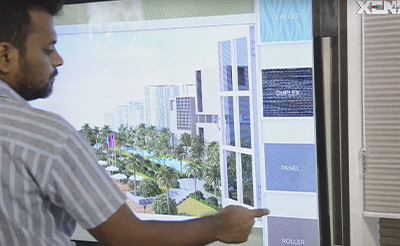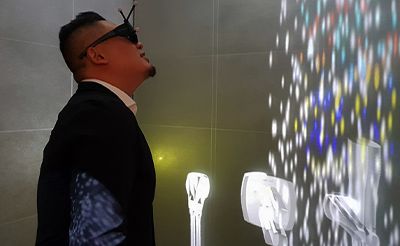Brand Experience Center
In an experience centre the most important thing for us to achieve is compelling storytelling, in order to deliver the message in a way that is innovative as well as engaging.
In the ever-changing landscape of our world, where life evolves continually, technology also adapts and updates itself. While the shift towards e-commerce has transformed the way products are sold, brick-and-mortar retail outlets remain significant, symbolizing more than just a brand's financial standing.
In a society where access to various services and products can be achieved from the comfort of one's home, the incentive to venture out into the three-dimensional world is diminishing. Marketers, often regarded as wizards, face the challenge of innovation fatigue, where traditional tricks lose their charm, and new ideas seem exhausted. However, life always finds a way, and experiential marketing emerges as a powerful tool for marketers to captivate audiences with immersive brand experiences.
Experiential marketing goes beyond traditional approaches by engaging the user's senses, creating a receptive environment for the brand's content. Retail outlets, once unidirectional in their approach, now embrace experiential marketing to differentiate themselves. Brands like Grohe, Myntra, and D’decor are pioneers in incorporating futuristic technology and brand experience centers into their retail spaces.
For instance, Grohe, a global leader in sanitary fittings, faced a challenge with products like shower systems that are not easily experienced firsthand. To address this issue, they introduced a virtual reality setup in their Singapore outlet. This innovative approach allowed users to pre-select multiple showerheads, step into the virtual booth, and initiate a simulation to experience Grohe's offerings. This not only provided a hassle-free alternative to physical trials but also showcased the brand's commitment to embracing futuristic technology.
Myntra and D’decor have similarly elevated the retail experience by integrating user-friendly interfaces, interactive displays, and advanced technologies in their brand experience centers. These spaces serve as more than just points of sale; they become immersive hubs where customers can engage with the brand on a deeper level.
In summary, we can say experential marketing, futuristic technology, and brand experience centers has transformed retail outlets into dynamic spaces. These spaces not only offer products but also provide an immersive journey, making them indispensable for brands looking to stay ahead in a rapidly evolving market.





